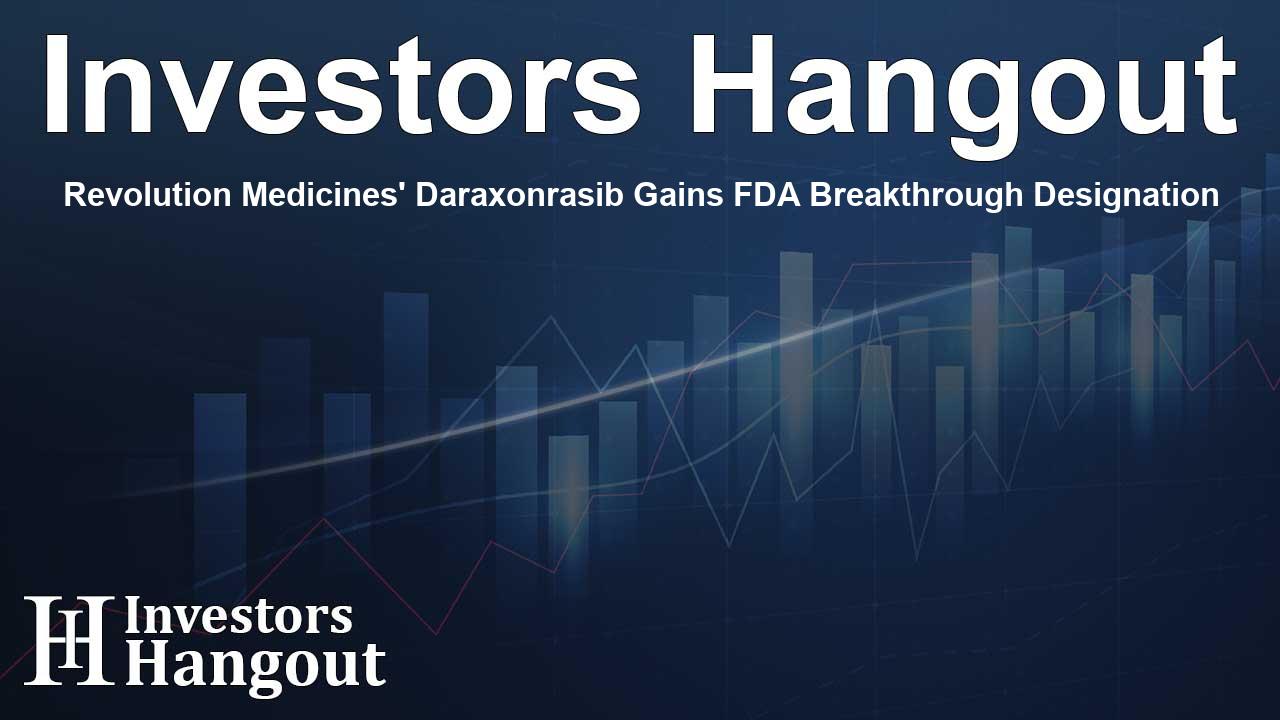Revolution Medicines' Daraxonrasib Gains FDA Breakthrough Designation

Significant Milestone for Daraxonrasib and Patients with Pancreatic Cancer
Revolution Medicines, Inc. is making waves in the oncology world as it announces the U.S. Food and Drug Administration (FDA) has granted Breakthrough Therapy Designation for their innovative treatment, daraxonrasib. This recognition is a critical step that could radically change the treatment landscape for those battling metastatic pancreatic cancer, particularly patients with KRAS G12 mutations, which are prevalent in this aggressive disease.
Understanding the Breakthrough Therapy Designation
The Breakthrough Therapy Designation is awarded to treatments that demonstrate substantial preliminary clinical evidence suggesting significant improvement in efficacy over existing therapies for serious conditions. This designation will expedite the development and review process for daraxonrasib, which stands out due to its targeted approach in addressing pancreatic ductal adenocarcinoma (PDAC), one of the deadliest forms of cancer.
Clinical Evidence Supporting the Designation
The designation stems from promising early clinical trial results from the Phase 1 RMC-6236-001 study, demonstrating the drug's potential effectiveness in previously treated PDAC patients. "This Breakthrough Therapy Designation underscores the substantial unmet need for innovative therapies in pancreatic cancer and highlights daraxonrasib's potential to make a meaningful difference for patients battling this disease," shared Mark A. Goldsmith, M.D., Ph.D., the CEO and chairman of Revolution Medicines.
Enrollment and Future Clinical Trials
As the company gears up for the next phases of development, they are actively enrolling patients in the RASolute 302 Phase 3 registrational study. This study is pivotal as it aims to validate the safety and efficacy of daraxonrasib in a larger population of patients. With hopes to complete enrollment this year, results are expected by 2026, marking a potential turning point in treatment for patients facing this challenging condition.
The Importance of RAS Mutations in Pancreatic Cancer
With over 90% of PDAC patients carrying RAS mutations, and a significant majority specifically having the KRAS G12 mutation, the need for targeted therapies like daraxonrasib becomes even more pressing. Current statistics suggest that pancreatic cancer will affect a large number of individuals, with the American Cancer Society predicting around 60,000 diagnoses. Unfortunately, because PDAC often presents at later stages, the survival rates are alarmingly low.
What Makes Daraxonrasib Unique?
The uniqueness of daraxonrasib lies in its mechanism as an oral, direct RAS(ON) multi-selective inhibitor. It directly blocks RAS signaling, thereby interfering with tumor growth driven by common oncogenic RAS mutations such as G12X, G13X, and Q61X. The innovative approach could provide a new avenue for patients who have limited treatment options.
Future of Revolution Medicines and Their Pipeline
Revolution Medicines is not stopping here; moreso, it has other promising compounds in its pipeline designed for various RAS mutations. The combination of daraxonrasib, elironrasib, and zoldonrasib presents an opportunity for tailored treatments based on specific genetic profiles, further enhancing patient care in oncology.
Conclusion: A Hopeful Path Ahead
The Breakthrough Therapy Designation granted to daraxonrasib illustrates Revolution Medicines’ commitment to advancing cancer care. This innovative treatment could potentially improve survival rates and quality of life for patients with metastatic pancreatic cancer equipped with KRAS G12 mutations. As the company progresses through clinical trials, hope shines for those affected by this devastating illness.
Frequently Asked Questions
What is the significance of Breakthrough Therapy Designation?
This designation is critical as it allows for expediting the development and review of new therapies that show potential for serious conditions with significant unmet medical needs.
Who are the primary patients targeted by daraxonrasib?
Daraxonrasib is targeted primarily at patients with metastatic pancreatic cancer that harbor KRAS G12 mutations, a common genetic alteration in this type of cancer.
What phases of clinical trials are currently ongoing for daraxonrasib?
Currently, Revolution Medicines is enrolling patients in the Phase 3 registrational study known as RASolute 302, which aims to assess the drug's efficacy and safety in a larger patient cohort.
How does daraxonrasib work?
Daraxonrasib functions as a multi-selective inhibitor that blocks RAS signaling pathways, effectively targeting the underlying mutations that drive the cancer.
What is the future outlook for Revolution Medicines?
With its innovative pipeline and ongoing studies, Revolution Medicines aims to continue advancing treatments for RAS-addicted cancers, potentially reshaping the landscape of oncology.
About The Author
Contact Hannah Lewis privately here. Or send an email with ATTN: Hannah Lewis as the subject to contact@investorshangout.com.
About Investors Hangout
Investors Hangout is a leading online stock forum for financial discussion and learning, offering a wide range of free tools and resources. It draws in traders of all levels, who exchange market knowledge, investigate trading tactics, and keep an eye on industry developments in real time. Featuring financial articles, stock message boards, quotes, charts, company profiles, and live news updates. Through cooperative learning and a wealth of informational resources, it helps users from novices creating their first portfolios to experts honing their techniques. Join Investors Hangout today: https://investorshangout.com/
The content of this article is based on factual, publicly available information and does not represent legal, financial, or investment advice. Investors Hangout does not offer financial advice, and the author is not a licensed financial advisor. Consult a qualified advisor before making any financial or investment decisions based on this article. This article should not be considered advice to purchase, sell, or hold any securities or other investments. If any of the material provided here is inaccurate, please contact us for corrections.
